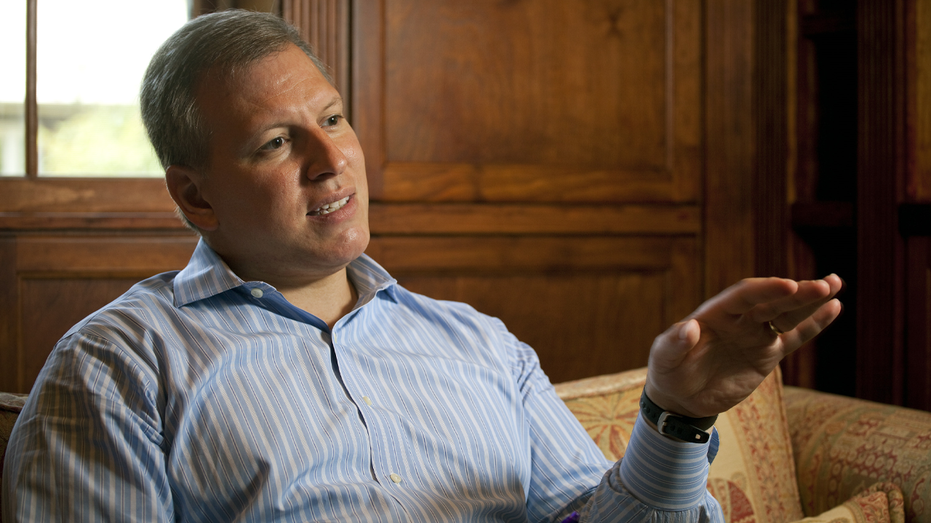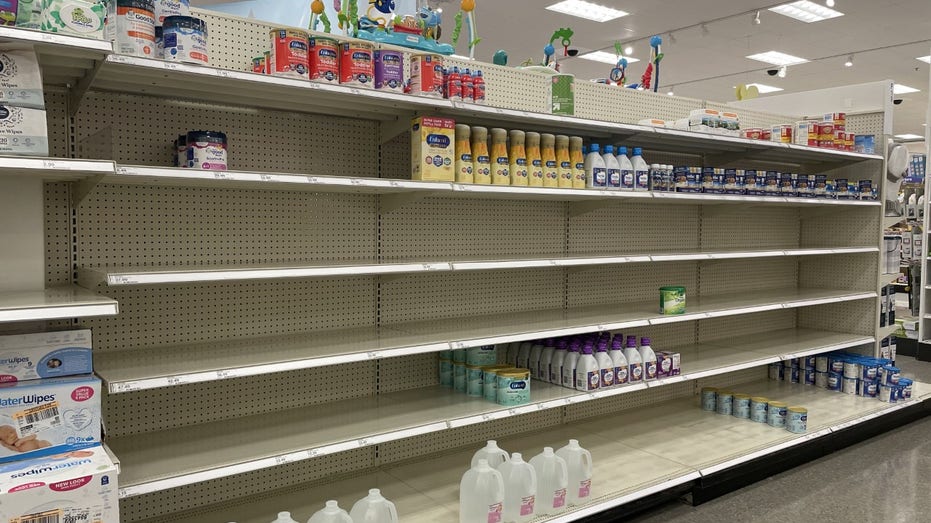Biden admin’s ‘bureaucratic bungling' made baby formula shortage worse, CEO who rescued GM says
The recession the U.S. is potentially facing under Biden may be 'more complicated, harder to solve and just as dire' as the 2008 economic crisis, according to Harry Wilson
Rep. Mace on baby formula shortage: We're in a crisis right now
Rep. Nancy Mace, R-S.C., discusses the baby formula shortage as Abbott Labs and the FDA reach a deal to reopen the plant, the White House being challenged on raising taxes on corporations and Biden's presidency.
CEO and corporate recovery expert responsible for turning around General Motors in 2009 blames the Biden administration’s ‘bureaucratic bungling’ and a host of corporate and government ‘screw-ups’ for exacerbating the infant formula crisis.
Turnaround CEO and Goldman Sachs alum Harry Wilson has spent the last 30 years rescuing companies on the brink of collapse by cutting wasteful spending and reorganizing inefficient corporate structures. In 2009, during the aftermath of the 2008 economic crisis, Wilson, a lifelong Republican, was brought in by the Obama administration as a senior adviser to the U.S. Department of the Treasury and led the turnaround of General Motors after it filed for Chapter 11 bankruptcy.
BABY FORMULA SHORTAGE: CHANGES ABBOTT MADE AHEAD OF MICHIGAN PLANT RESTART
Now, as a candidate for governor of New York, Wilson is calling out both the Biden administration and corporate leaders for ‘failures’ that have exacerbated a baby formula shortage that came on the heels of a product recall at the Abbott plant in Michigan following reports of contamination and has sent parents of infants in all corners of the U.S. into a frenzy.

President Biden took heat from the liberal media last week. (AP) Store shelves are empty after a baby formula shortage. (AP Newsroom; Fox News Digital / AP Newsroom)
"Because of bureaucratic bungling, slowness and not dealing with the implications of an oversupply economy, we now have this tragic shortage that's really hurting families across the country," Harry Wilson told Fox News Digital.
Wilson said the recession the U.S. is potentially facing under Biden may be "more complicated, harder to solve and just as dire" as the 2008 economic crisis and is partly to blame for the fear and uncertainty many parents are facing following the Abbott plant shutdown.
Wilson claims Biden’s American Rescue Plan Act (ARPA) is responsible for sky-high prices affecting consumer across the country and said the negative impact of the $1.9 trillion stimulus package doesn’t end with inflation.
"There are other effects driven by excess demand, driven by federal government spending. So, for example, because there's excess demand, that's putting strain on both freight and labor and well, that's true for the whole economy," Wilson said.
Without the freight and labor capacity to deal with ramping up production outside the Abbott plant, it’s not possible to meet the demand for goods even as critical as infant supplies, according to Wilson.
ABBOTT SAYS IT WILL BE AT LEAST TWO MONTHS BEFORE BABY FORMULA FROM SHUTTERED PLANT HITS SHELVES
"So it's a direct result of the Biden administration overstimulating the economy through ARPA," the CEO told Fox News Digital.
Acknowledging that "recalls are always a risk," even at top-performing companies, Wilson still isn’t convinced that the contamination was handled efficiently by either Abbott or the Biden administration.

Harry Wilson, founder and chief executive officer of the corporate restructuring firm Maeva Advisors LLC, speaks during an interview at his home in Scarsdale, New York, U.S., on Thursday, Aug. 30, 2012. Wilson was a senior member of the U.S. Treasury (Michael Nagle/Bloomberg via Getty Images / Getty Images)
"The whistleblower who identified the problem in Abbott called the FDA in October. They weren't even interviewed until December. The inspection of the plants didn’t happen until January for the recall to first happen in February. "
The amount of time that lapsed is unacceptable, according to Wilson, particularly that it concerns products serving the population’s most vulnerable members.
"When you have a safety-related issue, particularly one that involves the life and health of infants, it's got to be dealt with immediately," Wilson said firmly.
Even more unacceptable to Wilson than the timeline for the product’s recall was the fact that the government failed to use that four-month period to put a contingency plan in place.
Wilson says that such a plan should have included government measures such as working to allow more high quality producers of baby formula in Canada and Europe to sell in U.S. markets by amending FDA labeling rules and adjusting tariff policies, both of which he claims can be done "in a matter of days." Additionally, to provide some immediate relief to many in need, the federal government should have quickly expanded the list of formula brands currently within the network of the Special Supplemental Nutrition Program for Women, Infants, and Children (WIC).
Wilson also laid out corporate fixes, such as expanding shifts for qualified and trained workers to both address the contamination issue at the Abbott plant quicker, while also ramping up production at other plants. In his assessment, production can be safely increased by 30-50% this way. In tandem with government support, Wilson said formula producers need to prioritize expedited shipping on all critical products to ensure that what they produce is actually making it out to families in need across the country.
BABY FORMULA SHORTAGE: WHITE HOUSE WORKING ‘24/7’ TO ADDRESS SUPPLY CRUNCH
"All those things would take something that's become a huge problem, make it much smaller and get it resolved much faster," Wilson said of his suggestions.
Following this interview, the Biden administration announced it would begin increasing imports from overseas to increase supplies of baby formula in the U.S.
While Wilson hopes the crisis is fully resolved before and dire consequences occur, he is adamant that broader changes need to be made to ensure a similar shortage does not affect other critical supplies.
"We saw this during the pandemic with masks and other kinds of pandemic related supplies. You see the same thing for semiconductors and a lot of other fields already," Wilson said. "We run a very tight supply chain, but need to be kind of more forward-thinking and planning things for contingencies to make sure that we can, you know, kind of plan ahead."

Stores in the Twin Cities area are struggling to keep baby formula in supply. (Fox News / Fox News)
For Wilson, planning ahead means having contingency plans like the one outlined above in place for any critical supplies and preventing delays in addressing problems like the one at Abbott by working with industries to identify and report problems early on, rather than fostering a regulatory environment that makes large companies fearful of admitting to an accident of mistake.
"We need regulators who are in a problem-solving mode, not in confrontational mode," Harry told Fox News Digital. "If you self-report a problem quickly, then there's little or no penalty because you want to encourage companies to do that as opposed to hide problems or cover them up."
However, when companies fail to report early, Wilson said the consequences "have to be severe."
"You basically create this carrot and stick approach where you identify problems much more rapidly," Wilson said. "And if that had been the case, then instead of losing four months between the whistleblower calling and the recall, you could have had it done in a matter of weeks."
Wilson announced his candidacy for governor of New York in an exclusive interview with Fox News Digital where he pledged to invest $12 million of his own money to win the seat. In 2010, he came close to defeating Democratic incumbent comptroller Tom DiNapoli, losing by less than three points in the heavily blue state.
GET FOX BUSINESS ON THE GO BY CLICKING HERE
New York Congressman Lee Zeldin and Andrew Giuliani, son of former Mayor Rudy Giuliani are also vying for the gubernatorial seat and will face off against Wilson in a primary election on June 28, 2022.
Wilson previously helped turn around companies as an employee of Goldman Sachs, Blackstone and Silver Point Capital before starting his own firm, MAEVA Group, where he currently serves as CEO.





















